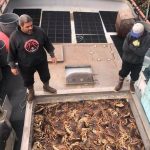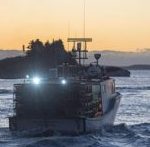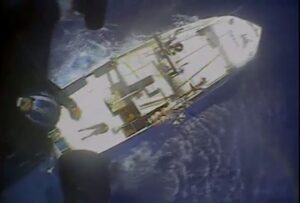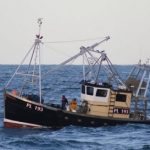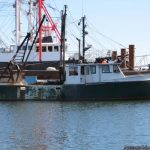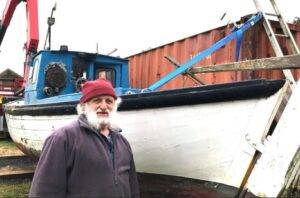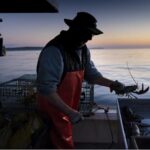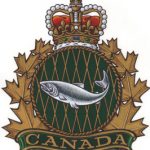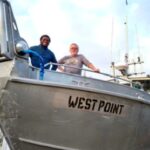Category Archives: Pacific
At Seattle-based seafood giant Trident, a new generation is at the helm
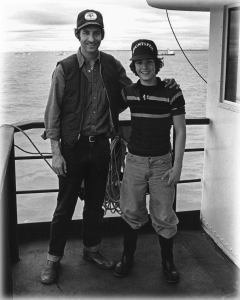 Joe Bundrant’s first Alaska summer with Trident Seafoods was back in 1979, a tense time for the Seattle-based company founded by his father Chuck Bundrant. The Bristol Bay salmon run was in full swing. But a bitter strike over low prices kept nets out the water, and shut down the regional harvest. Chuck Bundrant had piled up debt to build the Bountiful, a 165-foot processing vessel that was then only a year old. He didn’t want it to sit idle. So, he urged the fishermen to cross the picket line and allow him to freeze their sockeye catch. When the season was over, he pledged to settle with them on a fair market value “He just said, ‘Trust me.’ And those guys went fishing. It was a very powerful lesson for a young guy,” click here to read the story 12:35
Joe Bundrant’s first Alaska summer with Trident Seafoods was back in 1979, a tense time for the Seattle-based company founded by his father Chuck Bundrant. The Bristol Bay salmon run was in full swing. But a bitter strike over low prices kept nets out the water, and shut down the regional harvest. Chuck Bundrant had piled up debt to build the Bountiful, a 165-foot processing vessel that was then only a year old. He didn’t want it to sit idle. So, he urged the fishermen to cross the picket line and allow him to freeze their sockeye catch. When the season was over, he pledged to settle with them on a fair market value “He just said, ‘Trust me.’ And those guys went fishing. It was a very powerful lesson for a young guy,” click here to read the story 12:35
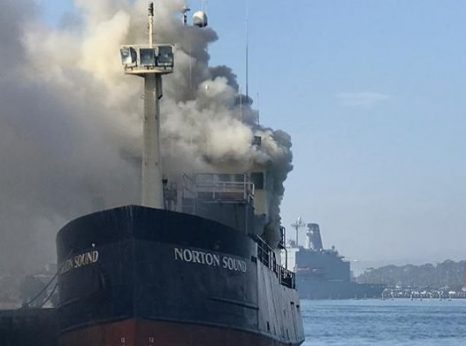
BREAKING: Multi-alarm fire erupts on fishing vessel docked in San Diego Bay
A fire on a 120-foot fishing vessel billowed smoke over the San Diego Harbor area early Friday. Crews from U.S. Coast Guard San Diego, San Diego Harbor Police, and San Diego Fire responded to the multi-alarm fire at 750 North Harbor Drive near G Street, around 9:30 a.m. The fire was contained to the vessel “Norton Sound” as it was docked in the bay. No injuries have been reported and crews are working to determine if anyone was on the ship when the fire began. The blaze began as a two-alarm fire, before growing to a three-alarm fire and forcing firefighters off the vessel. Video, photos, click here to read the story 15:01
Everyone’s Mad About Fugitive Salmon in the Pacific Northwest!
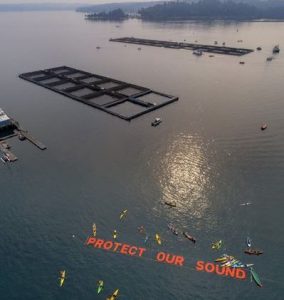 In a giant refrigerated warehouse 90 miles north of Seattle, 43,500 Atlantic salmon were stacked in plastic crates, frozen pariahs in a kingdom where Pacific salmon rule. For weeks, locals used nets to chase down the intruders, not to eat them or sell them, but to get them out of the water. Native fishermen who’ve worked Puget Sound for decades mocked them for looking different. Chefs and foodies refused to so much as lay a boning knife on them. Scientists, for their part, say they’re perfectly edible — a good source of protein in a world where increasing numbers of people could use some. But nobody is listening. click here to read the story 09:01
In a giant refrigerated warehouse 90 miles north of Seattle, 43,500 Atlantic salmon were stacked in plastic crates, frozen pariahs in a kingdom where Pacific salmon rule. For weeks, locals used nets to chase down the intruders, not to eat them or sell them, but to get them out of the water. Native fishermen who’ve worked Puget Sound for decades mocked them for looking different. Chefs and foodies refused to so much as lay a boning knife on them. Scientists, for their part, say they’re perfectly edible — a good source of protein in a world where increasing numbers of people could use some. But nobody is listening. click here to read the story 09:01
Whale Protection Bill SB 1287 – North Coast Senator speaks on progress
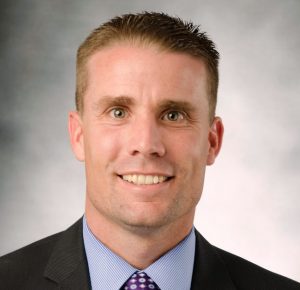 North Coast Senator Mike McGuire’s Whale Protection Bill has passed, and now involved agencies are working on implementation. Senate Bill 1287 aims to help stop whale entanglements by crab and fishing gear up and down the California coast. Governor Brown signed it into law in September of last year, which saw a record breaking number of entangled whales, with 66 off the California coast alone. The senator hopes the bill will be fully implemented by mid-2018. It will require crabbers to be responsible for collecting their gear, or else they could face losing their commercial fishing license. click here to read the story 11:25
North Coast Senator Mike McGuire’s Whale Protection Bill has passed, and now involved agencies are working on implementation. Senate Bill 1287 aims to help stop whale entanglements by crab and fishing gear up and down the California coast. Governor Brown signed it into law in September of last year, which saw a record breaking number of entangled whales, with 66 off the California coast alone. The senator hopes the bill will be fully implemented by mid-2018. It will require crabbers to be responsible for collecting their gear, or else they could face losing their commercial fishing license. click here to read the story 11:25
Inmarsat launches new Pacific North West Pricing Plan for Fleet One
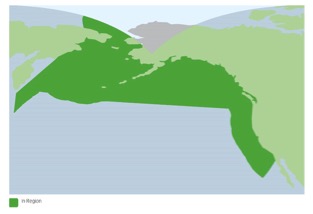 The new single SIM subscription plan represents the latest Inmarsat initiative to enhance vessel performance for Pacific North West fishers, while also ensuring the safety of those at sea. The targeted offer covers the Gulf of Alaska, South East Alaska, and the North West Canadian and US coastal area (Washington, Oregon, and California), as well as parts of the Bering Sea*. It delivers free Fleet One-to-Fleet One voice calls for up to 30 minutes, Pay-as-you-go IP data and the seasonal flexibility to suspend services during inactive periods. click here to read the story 17:48
The new single SIM subscription plan represents the latest Inmarsat initiative to enhance vessel performance for Pacific North West fishers, while also ensuring the safety of those at sea. The targeted offer covers the Gulf of Alaska, South East Alaska, and the North West Canadian and US coastal area (Washington, Oregon, and California), as well as parts of the Bering Sea*. It delivers free Fleet One-to-Fleet One voice calls for up to 30 minutes, Pay-as-you-go IP data and the seasonal flexibility to suspend services during inactive periods. click here to read the story 17:48
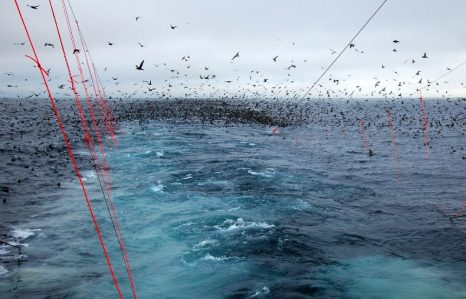
Collaborative project between researchers, fishermen aims to reduce West Coast seabird bycatch
A collaborative project between researchers and the West Coast sablefish fishing industry is showing promise for reducing the number of seabirds caught in longline fishing gear, in particular several albatross species including one threatened with extinction. The combination of using streamer lines (also called bird-scaring lines) to protect longline fishing gear from seabird attacks on baits, and setting hooks at night when the birds are less active can significantly reduce seabird mortality, the researchers say. click here to read the story 12:39
Legislative Hearing on 4 Fishery Bills – Tuesday, September 26, 2017 10:00 AM
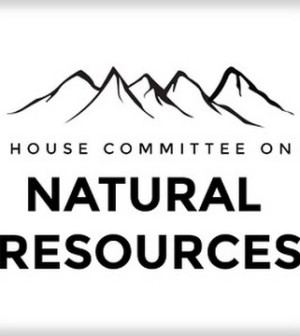 H.R. 200 (Rep. Don Young), To amend the Magnuson-Stevens Fishery Conservation and Management Act to provide flexibility for fishery managers and stability for fishermen, and for other purposes. click here H.R. 2023 (Rep. Garret Graves), To modernize recreational fisheries management Modernizing Recreational Fisheries Management Act of 2017 click here H.R. 3588 (Rep. Garret Graves), To amend the Magnuson-Stevens Fishery Conservation and Management Act to provide for management of red snapper in the Gulf of Mexico, and for other purposes. click here RED SNAPPER Act Discussion Draft of H.R. ____ (Rep. Jared Huffman), To amend and reauthorize the Magnuson-Stevens Fishery Conservation and Management Act, and for other purposes. click here To read the notice, click here 12:29
H.R. 200 (Rep. Don Young), To amend the Magnuson-Stevens Fishery Conservation and Management Act to provide flexibility for fishery managers and stability for fishermen, and for other purposes. click here H.R. 2023 (Rep. Garret Graves), To modernize recreational fisheries management Modernizing Recreational Fisheries Management Act of 2017 click here H.R. 3588 (Rep. Garret Graves), To amend the Magnuson-Stevens Fishery Conservation and Management Act to provide for management of red snapper in the Gulf of Mexico, and for other purposes. click here RED SNAPPER Act Discussion Draft of H.R. ____ (Rep. Jared Huffman), To amend and reauthorize the Magnuson-Stevens Fishery Conservation and Management Act, and for other purposes. click here To read the notice, click here 12:29
Commercial Fishers and Fish Sellers Affected by the 2015 Refugio State Beach Oil Spill in California are Part of Class Action Lawsuit
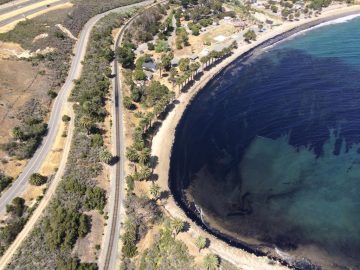 Notice has been issued to Fishers and Fish processing businesses confirming that their claims are now part of a class action that has been certified by the United States District Court. Information has been mailed to each identified class members and additional information is available on-line, through various trade associations, and various publications. The Class Action arises from the May 15, 2015 rupture of a corroded underground pipeline owned by Texas-based Plains All American near Refugio Beach. As a result of the spill, the Department of Fish and Wildlife imposed a ban on fishing in a 138-square-mile zone from Gaviota State Beach to Isla Vista. click here to read the press release 09:24
Notice has been issued to Fishers and Fish processing businesses confirming that their claims are now part of a class action that has been certified by the United States District Court. Information has been mailed to each identified class members and additional information is available on-line, through various trade associations, and various publications. The Class Action arises from the May 15, 2015 rupture of a corroded underground pipeline owned by Texas-based Plains All American near Refugio Beach. As a result of the spill, the Department of Fish and Wildlife imposed a ban on fishing in a 138-square-mile zone from Gaviota State Beach to Isla Vista. click here to read the press release 09:24
Skipper nods off, vessel collides with breakwater in Campbell River
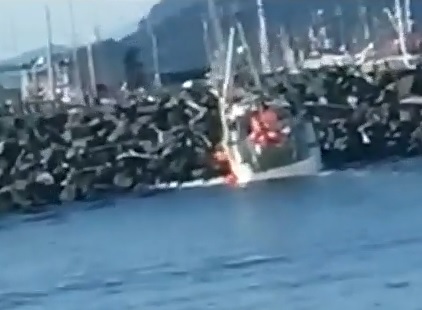 A fishing vessel going cruising speed hit the breakwater at a marina in Campbell River last night. The captain of The Powell River Queen, the ferry the runs between Campbell River and Quadra Island, witnessed the event, said Deborah Marshall, executive director of public affairs for B.C. Ferries. watch the video here 11:31
A fishing vessel going cruising speed hit the breakwater at a marina in Campbell River last night. The captain of The Powell River Queen, the ferry the runs between Campbell River and Quadra Island, witnessed the event, said Deborah Marshall, executive director of public affairs for B.C. Ferries. watch the video here 11:31
City of Monterey looking to buy up commercial fishing rights
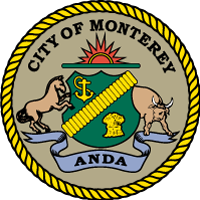 The city of Monterey wants to control nearly a million pounds of groundfish in Monterey Bay. At Tuesday’s City Council meeting, councilors looked at purchasing the fishing rights to 880,000 pounds of fish from Monterey native Giuseppe Pennisi. Pennisi is about to put his federally allotted fishing quota on the market and City Manager Mike McCarthy said the city is ready to pay $583,000 to buy the rights. “If the city is unable it is unlikely any other local organization will be able to buy it,” McCarthy said. The fear is an outside organization from Oregon or Washington would come in and buy the stock, pushing out local fishermen. click here to read the story 11:23
The city of Monterey wants to control nearly a million pounds of groundfish in Monterey Bay. At Tuesday’s City Council meeting, councilors looked at purchasing the fishing rights to 880,000 pounds of fish from Monterey native Giuseppe Pennisi. Pennisi is about to put his federally allotted fishing quota on the market and City Manager Mike McCarthy said the city is ready to pay $583,000 to buy the rights. “If the city is unable it is unlikely any other local organization will be able to buy it,” McCarthy said. The fear is an outside organization from Oregon or Washington would come in and buy the stock, pushing out local fishermen. click here to read the story 11:23
David Morgan, heroic deckhand in deadly 1986 Bodega Bay shipwreck, dies at 62
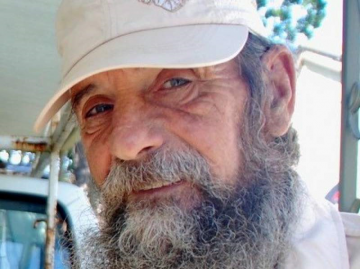 Nine people out for a day of ocean fishing perished in the sudden tragedy that struck the Merry Jane party boat just outside of Bodega Harbor in 1986, but more might have died had deckhand David Morgan not responded as he did. Moments after the impact of a great wave threw 19 people overboard, Morgan grabbed every life jacket and ring and floating device he could find and flung them into the water. He broadcast a call for help from the nearby Coast Guard station and, to calculate how many people were overboard, he asked two passengers to count everyone still on the boat. His wife, Kathie Morgan, recalls, “He woke up screaming in the night for a month after that, night after night.” David Morgan, who fished commercially until 1996 and then changed to work on solid ground and in his free time fished the Napa River with his wife for fun and dinner, died Sept. 8 at his home just north of Santa Rosa. He was 62. click here to read the story 10:53
Nine people out for a day of ocean fishing perished in the sudden tragedy that struck the Merry Jane party boat just outside of Bodega Harbor in 1986, but more might have died had deckhand David Morgan not responded as he did. Moments after the impact of a great wave threw 19 people overboard, Morgan grabbed every life jacket and ring and floating device he could find and flung them into the water. He broadcast a call for help from the nearby Coast Guard station and, to calculate how many people were overboard, he asked two passengers to count everyone still on the boat. His wife, Kathie Morgan, recalls, “He woke up screaming in the night for a month after that, night after night.” David Morgan, who fished commercially until 1996 and then changed to work on solid ground and in his free time fished the Napa River with his wife for fun and dinner, died Sept. 8 at his home just north of Santa Rosa. He was 62. click here to read the story 10:53
Coast Guard rescues 2 after fishing vessel takes on water near Coos Bay, Oregon
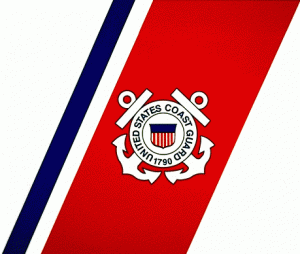 A Coast Guard 47-foot motor lifeboat crew from Station Coos Bay assisted the fishing vessel Car Tanya, Sunday evening. The boat crew successfully dewatered and towed the 58-foot fishing vessel 13 miles back to Coos Bay. Watchstanders at Coast Guard Sector North Bend received a request for assistance from the mariners aboard the vessel at 5:42 p.m., reporting the vessel was taking on water and losing power. At approximately 10 p.m., the boat crew moored up the fishing vessel in Coos Bay and conducted a post-Search and Rescue boarding, resulting in a termination order due to multiple discrepancies found aboard the vessel. click here to read the story 11:35
A Coast Guard 47-foot motor lifeboat crew from Station Coos Bay assisted the fishing vessel Car Tanya, Sunday evening. The boat crew successfully dewatered and towed the 58-foot fishing vessel 13 miles back to Coos Bay. Watchstanders at Coast Guard Sector North Bend received a request for assistance from the mariners aboard the vessel at 5:42 p.m., reporting the vessel was taking on water and losing power. At approximately 10 p.m., the boat crew moored up the fishing vessel in Coos Bay and conducted a post-Search and Rescue boarding, resulting in a termination order due to multiple discrepancies found aboard the vessel. click here to read the story 11:35
No West Coast fishery relief funds again in Congress’ $1.2T spending bill
 For Yurok Tribe member Sammy Gensaw III, the divide between Capitol Hill and his hometown of Requa on the mouth of the Klamath River is measured in more than miles. The tribe and commercial fishermen across the West Coast learned this past week that the House of Representatives once again did not include fishery disaster relief funds in a $1.2 trillion spending bill it approved. The relief funds would aid fishermen who suffered major losses after the disastrous 2015-2016 crab season and 2016 salmon season. This year’s salmon season was even worse, with the forecast return of Klamath River Chinook salmon being the lowest on record. click here to read the story 10:22
For Yurok Tribe member Sammy Gensaw III, the divide between Capitol Hill and his hometown of Requa on the mouth of the Klamath River is measured in more than miles. The tribe and commercial fishermen across the West Coast learned this past week that the House of Representatives once again did not include fishery disaster relief funds in a $1.2 trillion spending bill it approved. The relief funds would aid fishermen who suffered major losses after the disastrous 2015-2016 crab season and 2016 salmon season. This year’s salmon season was even worse, with the forecast return of Klamath River Chinook salmon being the lowest on record. click here to read the story 10:22
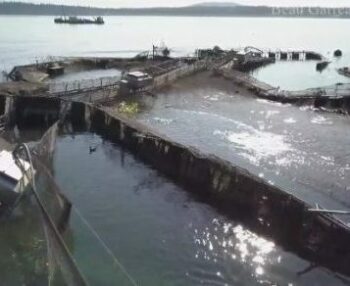
Protest seeks shutdown of Atlantic salmon farms in Washington state
Activists in Washington state plan to launch a protest flotilla on Saturday in the Pacific Ocean’s Puget Sound over the accidental release of tens of thousands of farm-raised Atlantic salmon that they say threaten dwindling stocks of wild fish. The afternoon protest, which seeks to shut down farms that raise the non-native salmon in underwater pens, is expected to draw dozens of boats, kayaks and canoes on a route along the San Juan Islands where the spill happened. That raised fears they would compete with wild fish for food, prey on the young, and expose them to disease. Protesters said native fish like Chinook salmon and steelhead trout were already struggling before the spill. click here to read the story 13:26
Trade groups want 10-year requirement removed from Magnuson-Stevens Act
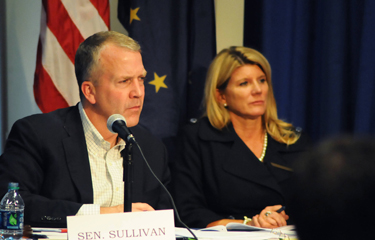 As Congress gets ready to address reauthorizing the Magnuson-Stevens Act, representatives from commercial fishing interests are urging lawmakers to revisit some of the current law’s regulations they feel have hindered the industry. In particular, they’re urging officials to do away with language that caps rebuilding plans for overfished species to 10 years. It’s an arbitrary figure that has too rigidly applied across all federally managed species, said Lori Steele, the executive director of the West Coast Seafood Processors Association, at a hearing Tuesday of the Senate Committee on Commerce, Science and Transportation’s Subcommittee on Oceans, Atmosphere, Fisheries and Coast Guard. click here to read the story 10:50
As Congress gets ready to address reauthorizing the Magnuson-Stevens Act, representatives from commercial fishing interests are urging lawmakers to revisit some of the current law’s regulations they feel have hindered the industry. In particular, they’re urging officials to do away with language that caps rebuilding plans for overfished species to 10 years. It’s an arbitrary figure that has too rigidly applied across all federally managed species, said Lori Steele, the executive director of the West Coast Seafood Processors Association, at a hearing Tuesday of the Senate Committee on Commerce, Science and Transportation’s Subcommittee on Oceans, Atmosphere, Fisheries and Coast Guard. click here to read the story 10:50
The Magnuson Stevens Act and its Ten Year Rebuilding Timeline: Science or Fiction? By Meghan Lapp – click here to read the article
California crabbers use GPS to find whale-killing gear
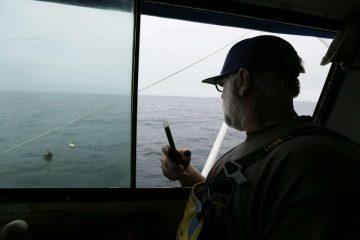 Fisherman Jake Bunch leans over the side of the fishing boat “Sadie K,” spears his catch, and reels it aboard: an abandoned crab pot, dangling one limp lasagna noodle of kelp and dozens of feet of rope, just the kind of fishing gear that has been snaring an increasing number of whales off U.S. coasts. This year, Bunch is one of small number of commercial fishermen out of Half Moon Bay, south of San Francisco, and five other ports up and down California who headed to sea again after the West Coast’s Dungeness crab season ended this summer. The California fishermen are part of a new effort using their cellphones’ GPS and new software pinpointing areas where lost or abandoned crabbing gear has been spotted. They retrieve the gear for a payment — at Half Moon Bay, it’s $65 per pot —before the fishing ropes can snag a whale. click here to read the story 20:44
Fisherman Jake Bunch leans over the side of the fishing boat “Sadie K,” spears his catch, and reels it aboard: an abandoned crab pot, dangling one limp lasagna noodle of kelp and dozens of feet of rope, just the kind of fishing gear that has been snaring an increasing number of whales off U.S. coasts. This year, Bunch is one of small number of commercial fishermen out of Half Moon Bay, south of San Francisco, and five other ports up and down California who headed to sea again after the West Coast’s Dungeness crab season ended this summer. The California fishermen are part of a new effort using their cellphones’ GPS and new software pinpointing areas where lost or abandoned crabbing gear has been spotted. They retrieve the gear for a payment — at Half Moon Bay, it’s $65 per pot —before the fishing ropes can snag a whale. click here to read the story 20:44
Japan’s Fukushima nuclear disaster didn’t affect fish, humans in B.C., scientist says
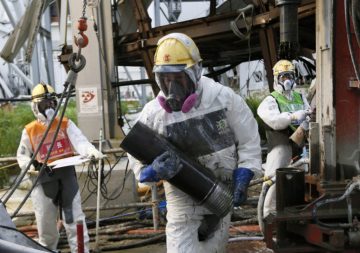 Radioactive contamination following a nuclear power-plant disaster in Japan never reached unsafe levels in the north Pacific Ocean for either marine life or human health, says a British Columbia scientist. Chemical oceanographer Jay Cullen of the University of Victoria has monitored levels of contamination from radioactive isotopes, used in cancer therapies and medical imaging, since the meltdown of three reactors at the Fukushima Daiichi plant in 2011 following a tsunami triggered by an earthquake. click here to read the story 18:29
Radioactive contamination following a nuclear power-plant disaster in Japan never reached unsafe levels in the north Pacific Ocean for either marine life or human health, says a British Columbia scientist. Chemical oceanographer Jay Cullen of the University of Victoria has monitored levels of contamination from radioactive isotopes, used in cancer therapies and medical imaging, since the meltdown of three reactors at the Fukushima Daiichi plant in 2011 following a tsunami triggered by an earthquake. click here to read the story 18:29
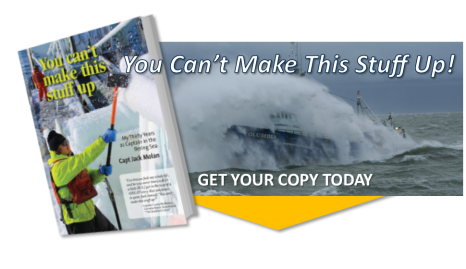
From Captain Jack Molan – Book Launch! We have lift off!
My book of short stories, “You Can’t Make This Stuff Up!” is available on Amazon, both paperback and E-Book (click here) This covers thirty years in the Bering Sea, the stories will grab you! Please share with your friends, in the new world of self publishing, its the best way to spread the word. After reading, please visit Amazon and leave a review. The reviews are really important and will get the book more exposure. I hope you enjoy reading as much as I did writing. Click here for a short video about how I came to write such a tail. 16:57
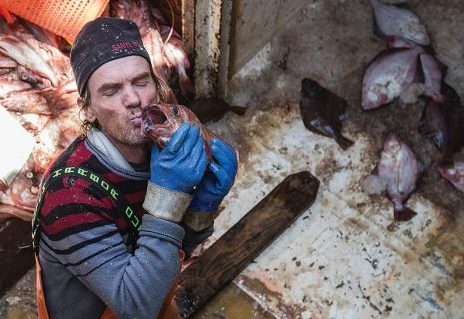
Pilot Program – Port allows fish sales from boats at Fisherman’s Wharf
Fishermen have been granted the legal right to sell fish from their boats at Fisherman’s Wharf for the first time in nearly two decades. The pilot program, approved by the Port Commission on Tuesday afternoon, will last for one year, at which time the Port will consider making it permanent. The effort is meant to help fishermen survive in the rocky fishing industry. “We’re struggling just to keep our boat here,” said Giuseppe “Joe” Pennisi, who captains the fishing boat “Pioneer” out of San Francisco. click here to read the story 11:37
Hearing! 2:30 p.m. on Tuesday – MSA Reauth – Oversight of Fisheries Management Successes and Challenges
 U.S. Sen. Dan Sullivan (R-Alaska), chairman of the Subcommittee on Oceans, Atmosphere, Fisheries, and Coast Guard, will convene the hearing titled “Reauthorization of the Magnuson-Stevens Fishery Conservation and Management Act: Oversight of Fisheries Management Successes and Challenges” at 2:30 p.m. on Tuesday, September 12, 2017. The hearing is the third of the series and will focus on the perspectives of commercial, charter, and recreational fishermen on the state of our nation’s fishery laws. click here to read the press release This hearing will take place in Russell Senate Office Building, Room 253. Witness testimony, opening statements, and a live video of the hearing will be available on www.commerce.senate.gov. 23:24
U.S. Sen. Dan Sullivan (R-Alaska), chairman of the Subcommittee on Oceans, Atmosphere, Fisheries, and Coast Guard, will convene the hearing titled “Reauthorization of the Magnuson-Stevens Fishery Conservation and Management Act: Oversight of Fisheries Management Successes and Challenges” at 2:30 p.m. on Tuesday, September 12, 2017. The hearing is the third of the series and will focus on the perspectives of commercial, charter, and recreational fishermen on the state of our nation’s fishery laws. click here to read the press release This hearing will take place in Russell Senate Office Building, Room 253. Witness testimony, opening statements, and a live video of the hearing will be available on www.commerce.senate.gov. 23:24
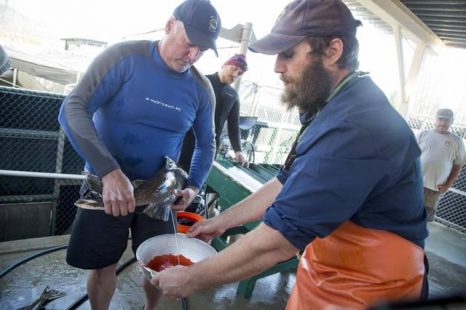
Do humans have it wrong? Treating salmon as commodity may threaten their wild existence
As once-uncountable Northwest salmon stocks have dwindled, humans have tried a number of remedies to bolster or replace the disappearing fish. We’ve caught them at dams and trucked and barged them past obstacles. When the fish return home, we strip them of their eggs, fertilize them in buckets and grow new generations of baby salmon in hatchery raceways. But what if humans have it all wrong? What if those efforts are not just not working, but actually reducing the salmon’s odds of survival? What if hatchery fish do more than just dilute the genetic fitness of the wild, native salmon that evolved to live and spawn in particular conditions in specific stretches of individual streams? click here to read the story 16:00
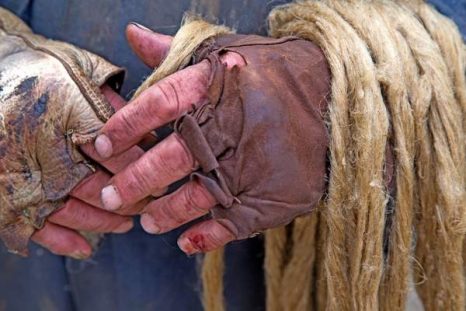
If hulls could talk: A summer of stories from the Ilwaco Boatyard
Earl Soule, 71, considers “re-corking,” or recaulking, a boat a lost art that requires a special touch. “The strength of a wooden boat is the seams,” Soule said. “Everybody thinks it’s the frame, but it’s the caulking. Caulking makes the whole boat tight.” Much of Soule’s work is done by sound and touch, a rare skill he’s cultivated over decades of working on wooden boats. “It’s all by feel,” Soule said in between swings of his mallet. “I can tell what it’s doing all the time because I can feel it.” Soule was helping Florian Mumford replace 12 ribs underneath the planks of Mumford’s 1953 wooden boat, ahead of the black cod season. He said he relies on the boatyard for haul out and repairs at least twice a year. photo’s, click here to read the story 09:08
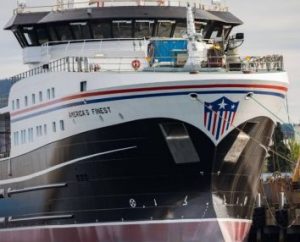
U.S.-Built Trawler is Not Jones Act-Qualified
The U.S. Coast Guard has issued another letter ruling on U.S. built vessels with foreign-made components. The latest case involves a factory trawler named America’s Finest under construction in the state of Washington. Certain “cold-formed” steel plates were already installed as part of the hull and the cold-forming process was conducted overseas. A U.S. shipyard requested coastwise and fisheries trade status for the vessel, and was just denied by the U.S. Coast Guard. click here to read the story 08:17
Warning signs for salmon
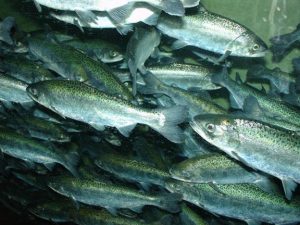 The numbers of young salmon caught off the Oregon and Washington state coasts during an annual federal survey cruise this June were among the lowest recorded in the past 20 years. In fact, numbers were low across nearly all the species researchers regularly catch or observe — from birds like the common murre to forage fish like anchovies and smelt. Months ahead of schedule, as a kind of heads up, West Coast researchers, project managers and program directors decided to send out a memo in mid-August detailing their initial findings — data that would usually be combined with other information and put out on a webpage at the end of the year. The data is preliminary, but researchers say it is clear many young coho and Chinook salmon didn’t survive the migration from freshwater streams and rivers to the ocean this year, while poor ocean conditions could impact salmon returns to the Columbia River for the next few years. click here to read the story 21:44
The numbers of young salmon caught off the Oregon and Washington state coasts during an annual federal survey cruise this June were among the lowest recorded in the past 20 years. In fact, numbers were low across nearly all the species researchers regularly catch or observe — from birds like the common murre to forage fish like anchovies and smelt. Months ahead of schedule, as a kind of heads up, West Coast researchers, project managers and program directors decided to send out a memo in mid-August detailing their initial findings — data that would usually be combined with other information and put out on a webpage at the end of the year. The data is preliminary, but researchers say it is clear many young coho and Chinook salmon didn’t survive the migration from freshwater streams and rivers to the ocean this year, while poor ocean conditions could impact salmon returns to the Columbia River for the next few years. click here to read the story 21:44
Countries Pledge To Recover Dwindling Pacific Bluefin Tuna Population
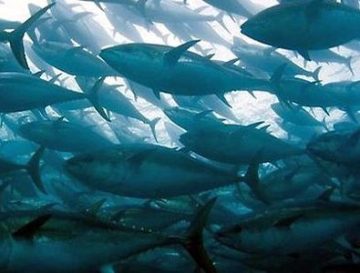 In a joint meeting Friday in Busan, South Korea, the two groups that manage Pacific bluefin tuna reached a historic long-term agreement that would put the species on the path to recovery. The Western and Central Pacific Fisheries Commission and the Inter-American Tropical Tuna Commission agreed to take steps to rebuild the population to 20 percent of historic levels by 2034 — a sevenfold increase from current levels. Stocks of Pacific bluefin have fallen to 2.6 percent of their historic size, with countries like Mexico, Japan, Korea and the U.S. exceeding fishing quotas within the last two years. click here to read the story 17:02
In a joint meeting Friday in Busan, South Korea, the two groups that manage Pacific bluefin tuna reached a historic long-term agreement that would put the species on the path to recovery. The Western and Central Pacific Fisheries Commission and the Inter-American Tropical Tuna Commission agreed to take steps to rebuild the population to 20 percent of historic levels by 2034 — a sevenfold increase from current levels. Stocks of Pacific bluefin have fallen to 2.6 percent of their historic size, with countries like Mexico, Japan, Korea and the U.S. exceeding fishing quotas within the last two years. click here to read the story 17:02
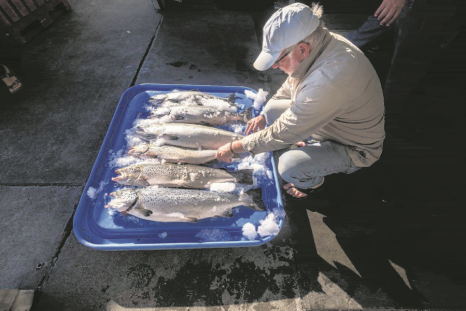
After Atlantic salmon spill, fish farms’ future under attack on both sides of border
Cooke Aquaculture Pacific knew it had problems at its Cypress Island fish farm before the catastrophic failure that spilled tens of thousands of Atlantic salmon into Puget Sound. “The farm site No. 2 was identified as the first priority for upgrades. We knew it was at the end of its life cycle and it needed upgrades right away, and we were in the process of doing that,” company spokesman Chuck Brown said this week. But the company never got the chance. Instead, the farm capsized the weekend of Aug. 19, with 305,000 Atlantic salmon inside. The company collected 142,176 in all from its nets. The rest escaped.,,, The state already has said it won’t allow new or expanded farms until further review, and 20 Western Washington tribes with treaty-protected fisheries say they want Puget Sound farms shut down entirely. click here to read the story 10:29
B.C. First Nations occupy a second salmon farm as company raises safety concerns – click here to read the story
Accused drug smuggling kingpin flown to US after living in Queensland
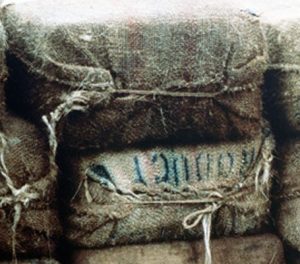 Alleged US marijuana smuggling kingpin Peyton Eidson is locked up in a California jail cell after 30 years on the run as a fugitive in Australia. Eidson’s American lawyer, Erick Guzman, hopes the 72-year-old is offered leniency by US prosecutors.,, US authorities have described Eidson as “the leader” of a sophisticated operation using fleets of vessels to secretly ship large quantities of high-grade marijuana from south-east Asia to northern California.,, Two co-accused, Mark Gayer and Mark Wolosky, attempted an elaborate scheme in 1989 to fake their deaths by sinking a fishing boat off California, but the duo was captured (read about it) in California in 2000 and sentenced to 11 years’ jail. click here to read the story 15:58
Alleged US marijuana smuggling kingpin Peyton Eidson is locked up in a California jail cell after 30 years on the run as a fugitive in Australia. Eidson’s American lawyer, Erick Guzman, hopes the 72-year-old is offered leniency by US prosecutors.,, US authorities have described Eidson as “the leader” of a sophisticated operation using fleets of vessels to secretly ship large quantities of high-grade marijuana from south-east Asia to northern California.,, Two co-accused, Mark Gayer and Mark Wolosky, attempted an elaborate scheme in 1989 to fake their deaths by sinking a fishing boat off California, but the duo was captured (read about it) in California in 2000 and sentenced to 11 years’ jail. click here to read the story 15:58
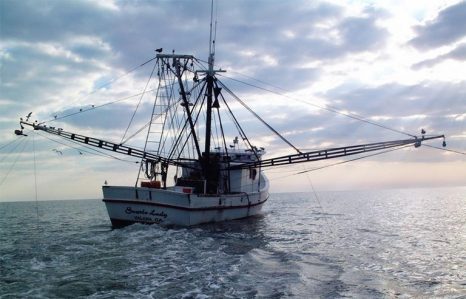
NIOSH regional reports highlight top dangers in commercial fishing industry
Vessel disasters and falls overboard are the primary hazards experienced by workers in commercial fishing – an industry with a fatality rate 29 times higher than the national average – according to a recent NIOSH analysis of four U.S. regions. NIOSH reviewed overall commercial fishing fatalities in Alaska, the Gulf of Mexico, and the East and West Coasts from 2010 to 2014. Researchers found that 184 fatalities occurred in the four regions: Alaska recorded 45, the West Coast had 30, the East Coast reported 60 and the Gulf of Mexico experienced 49. Vessel disasters (capsizes, fires, groundings, sinking) accounted for the most deaths with 80, followed by falls overboard with 53. Other categories included onboard, onshore and diving. click here to read the story 23:24
Marine feedlots and the tide against wild fish
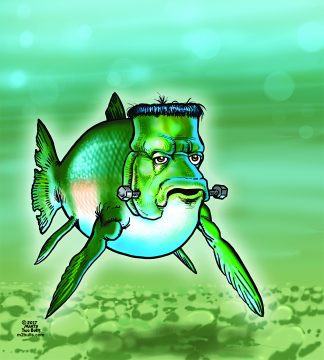 In a time of eclipse, for the People of the Salmon the moment was catastrophic. At the height of their season for the most prized of wild salmon in the Salish Sea, Lummi fishermen south of Cypress Island hauled in several flaccid, broken-mouthed farm fish, the first of thousands of Atlantic salmon that had escaped from a failed pen. They knew something was terribly wrong. Days would pass before Cooke Aquaculture, a subsidiary of the international company responsible for the pen, would stop blaming the sun and moon, and admit to the full scale of the collapse. click here to read the story
In a time of eclipse, for the People of the Salmon the moment was catastrophic. At the height of their season for the most prized of wild salmon in the Salish Sea, Lummi fishermen south of Cypress Island hauled in several flaccid, broken-mouthed farm fish, the first of thousands of Atlantic salmon that had escaped from a failed pen. They knew something was terribly wrong. Days would pass before Cooke Aquaculture, a subsidiary of the international company responsible for the pen, would stop blaming the sun and moon, and admit to the full scale of the collapse. click here to read the story
First Nations, environmentalists occupy salmon farm in British Columbia – A group of First Nations and environmentalists are occupying a salmon farm near Alert Bay, B.C., and say they won’t leave until the provincial and federal governments revoke permits for the facility. click here to read the story 10:43

































